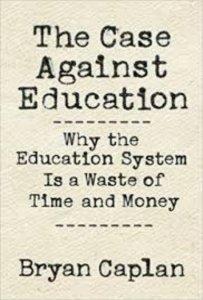
The Case Against Education: Why the Education System is a Waste of Time and Money. Bryan Caplan. Princeton University Press. 2018.
If you’re reading this, chances are you’ve spent a lot of time in classrooms. Ask yourself: how much of it was really worthwhile, and not just a necessary requirement for getting a useful bit of paper? In retrospect, I think I wasted hundreds of hours on things like trigonometry, crop rotation and cell biology. The specific subject matter might be different in your case, but I am sure you too spent ages on things you hated at the time, have never needed to use since and probably couldn’t remember now even if you had to. Now consider the least engaged people in those classes. Think about how much worse it was for them. Bored, confused, frustrated: how little did they get out of the experience?
That should give you some idea of why Bryan Caplan looks at the education system today and sees colossal waste. In schools and universities around the world, he sees irrelevant material being taught to uninterested students. In The Case Against Education, Caplan – Professor of Economics at George Mason University, and a prominent libertarian blogger – argues that Americans (and by implication people in other rich countries, including the UK) spend too much time in formal education.
Caplan’s central claim is that most of the benefit of education comes from signalling. That is, the majority of qualifications or degrees do not substantially increase your skills or knowledge. They do, however, ‘signal’ to employers that you have certain desirable underlying characteristics, such as intelligence, conscientiousness and conformity. By itself, signalling theory implies a radical change in perspective, portraying schools and universities as glorified human resources departments for employers. Yet it gets worse. Signalling is often positional – it marks you out relative to your peers. So as more people achieve a particular qualification, it tells us less about those that achieve it, leading to credential inflation as people need further qualifications to stand out. For example, certain jobs that might previously have needed only an undergraduate degree now expect a Master’s qualification too.
Signalling means that it is often rational for individuals to seek more education than is socially valuable. Caplan draws an analogy with a concert. If a few audience members stand up, they will temporarily be better able to see the stage. But then those around them will start standing too, with the end result that everybody is less comfortable and nobody has a better view. In the same way, as qualifications proliferate, rejecting education carries an ever-greater cost for individuals.
It is important to note that Caplan does not deny that some education provides socially valuable skills and knowledge – basic literacy or numeracy, for example. His claim is that, in many cases, this benefit is small enough that education is not worth the time and resources it uses up.
Caplan’s solution of ‘educational austerity’ is controversial. He thinks children should spend less time in school, particularly on subjects like history, art and music. He thinks we should encourage more children to work by relaxing child labour laws. He thinks there should be fewer university students, proposing cuts to public funding for higher education.
The Case Against Education is powerfully argued, provocative but not polemical, marrying a wealth of evidence with an engaging writing style. Caplan supplements his reading of the evidence effectively with logic, anecdotes and appeals to readers’ experiences. Throughout, he anticipates and addresses objections, almost before the reader can fully formulate them. After 300 pages, Caplan’s outlandish proposals seem not just plausible but natural conclusions, whether or not you share his ideological commitments.
It is clear to me that most education does not even claim to transmit practically useful content. Rather, the focus is usually on teaching students ‘how to think’: things like evaluating evidence, logical reasoning and formulating an argument. Yet Caplan claims that even this is largely unsuccessful. He cites psychological evidence that people often struggle to apply learning to different contexts as well as studies that indicate that reasoning skills change little over the course of a university degree. Indeed, standardised tests do suggest that a large proportion of American students (perhaps as high as a third) are no better at analysing arguments by the time they graduate. At the same time, these tests indicate that on average, students’ skills in these areas do improve. Then again, this does not tell us whether these improvements survive long after students leave university, and whether they would have improved anyway had they not continued on to higher education.
The relative balance between signalling and productive education matters a lot – though, as Caplan himself recognises, it is hard to measure with any sort of precision. If you agree with Caplan that education is mostly signalling, then almost any reduction in education is a good thing. However, the more you think education meaningfully boosts skills, the more worried you should be about discouraging socially worthwhile education. Caplan’s proposals do not appear especially well targeted. Reducing public subsidies and encouraging students to drop out of school might filter out less motivated students, but it is also likely to filter out the less affluent too.
In general, Caplan could say more about the distributional impact of reducing education. His view is that the poor lose most from signalling, and he anticipates a return to a world where a costly education is no longer a prerequisite for professional success. This seems naïve: I suspect the rich would be more likely to continue to reap the benefits of education (including signalling), while the poor are shut out or forced to stretch themselves further financially without government support. However, Caplan is on stronger ground when he points out that subsidising education is a rather indirect way to help the poor – would it not be more effective to redirect the money currently spent on education towards cash benefits or more targeted social programmes?
Of course, the practical politics of this is invidious. The ‘hand up’ of education is far more popular than the ‘hand out’ of benefits. But this gets to the heart of Caplan’s project: to knock education off this pedestal. Indeed, I think the best way to read Caplan’s book is not as a practical manifesto, but as a challenge to the role formal education plays in contemporary society.
When I think about what makes me feel squeamish about Caplan’s proposed education cuts, a large part is the fear of fixing people’s destiny at a young age and writing them off too early. Yet this worry only makes sense if we think of education as a ‘one-shot’ thing that happens when we’re in our teens. Caplan is definitely onto something when he identifies the compulsoriness of education as undermining its effectiveness. A natural implication of this, in my view, is that we should move away from seeing education as a ‘use it or lose it’ opportunity for children to perceiving it as an option available throughout our lives whenever we are ready.
Caplan’s argument is also more palatable if we recognise that the alternative to education need not be work. Caplan writes compellingly, if briefly, about the importance of play – not only at school, but also at university. For many young people, university offers an opportunity to try new things, meet new people, develop their identity and mature emotionally without the responsibilities and pressures of having to earn a living. I think Caplan is right when he says this ‘carefree exploration’ represents much of the value of formal education as it stands. As well as suggesting students of all ages should spend less time in the classroom, this raises a host of further questions. Should the government subsidise this time out of the labour force? Must it be taken when people are young, or might some people benefit from taking it later? Is it fair to exclude the half of the population outside higher education from this opportunity?
In contrast to so many of the classes Caplan rails against, The Case Against Education is well worth your time if you have an interest in education policy. Even if you fundamentally disagree with its conclusions, it will challenge your beliefs and clarify your thinking.
♣♣♣
Notes:
- This blog post appeared originally on LSE Review of Books.
- The post gives the views of its author, not the position of LSE Business Review or the London School of Economics.
- Featured image credit: Bryce Miller CC BY 2.0
- When you leave a comment, you’re agreeing to our Comment Policy
 Aveek Bhattacharya is a PhD student in Social Policy at the London School of Economics, where his research focuses on secondary school choice. He blogs at Social Problems Are Like Maths, and you can follow him on twitter @aveek18.
Aveek Bhattacharya is a PhD student in Social Policy at the London School of Economics, where his research focuses on secondary school choice. He blogs at Social Problems Are Like Maths, and you can follow him on twitter @aveek18.


 Find this book:
Find this book: